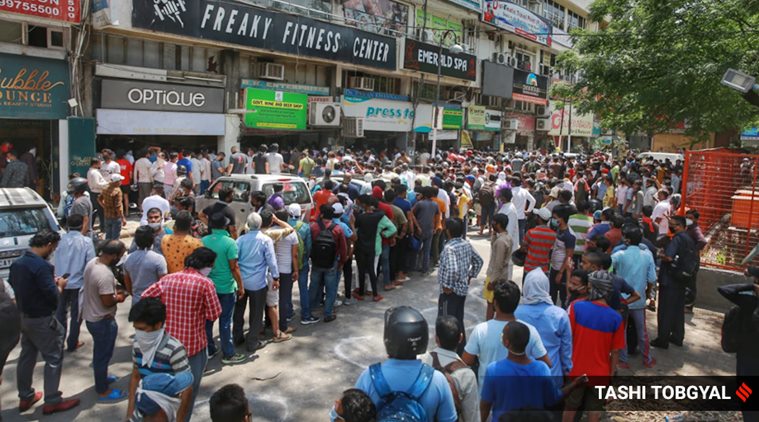 In Delhi, state-run liquor shops also saw people lining up in large numbers outside outlets, with police personnel struggling to manage the crowd.
In Delhi, state-run liquor shops also saw people lining up in large numbers outside outlets, with police personnel struggling to manage the crowd.
Hearing a clutch of petitions seeking to halt the sale of liquor during the coronavirus pandemic, the Delhi High Court came down heavily on the Centre and the Delhi government for the delay in formulating a mechanism of online delivery of alcohol, saying it can “exacerbate” the problem of overcrowding and increase the “probability” of spread of the novel coronavirus.
The court was hearing PILs, including one by a society, seeking direction to the Delhi government to immediately stop the sale of liquor and to not allow the sale till the situation prevalent in the country in the wake of Covid-19, improves.
It has also sought a direction to the authorities that social distancing norms of minimum six feet between each customer and presence of only five persons at one time at the shops across the city is ensured, where alcohol is being sold.
A bench of Justice Rajiv Sahai Endlaw and Justice Sangita Dhingra Sehgal disposed of five petitions, “though without granting any reliefs claimed but beseeching the GNCTD (Government of National Capital Territory of Delhi) and the Central Government to take a decision after considering the suggestions made during the hearing…”.
On the issue of online issuance of e-tokens for purchase of liquor, the bench said that the same has “not met with much success owing to the token holder thereof still being required to spend considerable time at the shop and which leads to crowding.”
It ordered that the decision be taken at the “earliest so that more damage than has already been done is not caused and so that the decision taken, serves the need of the hour”.
“We are afraid that any delay on the part of the Central Government and the GNCTD can exacerbate the problem of crowding outside liquor shops and would defeat the purpose, inasmuch as more the delay, more will be the number of persons outside liquor shops, each day, who will come in close contact with each other, increasing the probability of spread of Covid.
“Moreover, it is not as if the problem is of a permanent nature, solution whereof can be devised at leisure; the problem is perhaps of a few days more inasmuch as once the patrons of alcohol are satisfied that there would be no further closure, the crowding outside liquor shops is likely to disappear,” the bench observed.
The court’s observation and suggestion were issued after the counsel for the Centre and Delhi government stated that the Rules framed under the Excise Acts in force at this moment do not permit such online sale of liquor.
Senior advocate A S Chandiok, appearing for petitioner Sajag Nijhawan informed that Zomato, till now engaged in home delivery of food from restaurants, hotels and eateries, has offered to also participate in the home delivery of alcohol.
To which, the bench in its order passed on Monday, recorded that “we have however inquired from the senior counsel for petitioner (Sajag), whether home delivery of alcohol can be equated with home delivery of food.
“…The possibility of alcohol being snatched during transit cannot be ruled out. The possibility of home delivery of alcohol, distribution whereof till now is largely in the hands of State, would also increase the possibilities of adulteration of alcohol, also resulting in loss of life. It appears that transit of alcohol from home to home would have to be in the same manner and style as transit of cash between banks and between banks and ATMs,” the bench observed.
Delhi government’s Standing Counsel Ramesh Singh stated that all the vends could not be permitted to open because of restrictions already in force under the directions of the Central Government.
The bench, thereafter, enquired from the Centre and Delhi government’s counsel, why all the liquor vends already existing in the city cannot be opened up and which will automatically reduce crowding outside the limited number of shops which are open at present.
The counsels state that they will look into the said aspect.